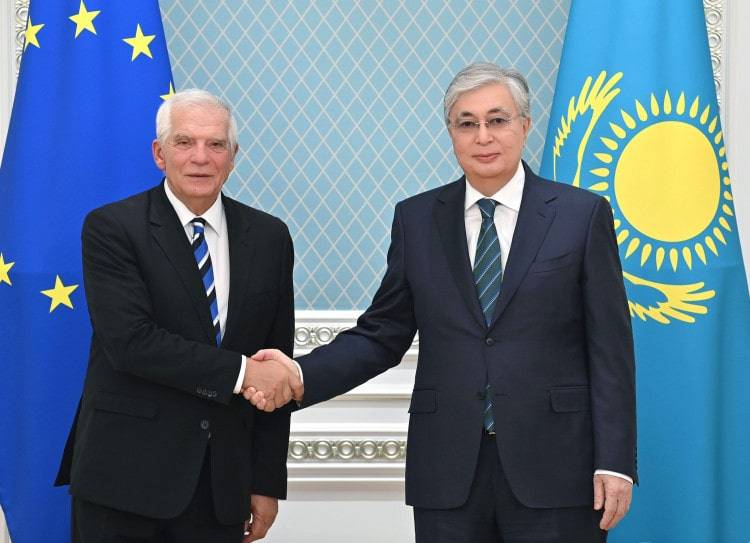During a visit to Astana, EU High Representative for Foreign Policy, Josep Borrell, outlined the EU’s strategy in the region, highlighting long-term and more resilient cooperation.
 Kassym-Jomart Tokayev and Josep Borrell.
Kassym-Jomart Tokayev and Josep Borrell.
Almaty, Kazakhstan, 17 November 2022 – Due to visiting Kazakhstan nowadays, the European Union’s High Representative for Foreign and Security Policy, Josep Borrell, outlined the importance of the country and the region as a partner for the EU, especially in light of current geo-political challenges.
Welcoming Josep Borrell, Kazakhstan’s Head of State, President Kassym-Jomart Tokayev, noted that Borrell’s visit to Astana is very important in terms of strengthening cooperation between Kazakhstan and the EU. According to the President, the Agreement between Kazakhstan and the European Union on enhanced partnership and cooperation marked the beginning of a new stage of deepening cooperation in all areas.
“I am glad that the EU and Kazakhstan are good partners”, Borrell congratulated Tokayev. “We talk about common challenges with mutual trust and respect. My visit to Astana comes at a very important time when you launched a serious reform process to transform the country to make it more open, more inclusive, and more democratic,” said the EU High Representative.
In an interview with Kazakhstani international news agency, KazInform, Borrell explained: “As we look at the prospects for EU-Central Asia cooperation today, we have to acknowledge that the international geopolitical context in which we operate has become more complex and challenging, in particular since Russia’s illegal invasion of Ukraine”.
He added, “In such a difficult context, our partnership is essential in addressing global challenges facing us all. The objectives of the EU Strategy for Central Asia are more relevant now than ever: promoting resilience, prosperity, and regional cooperation. We have aligned the EU’s cooperation with Central Asia along these priorities. As a reliable and predictable partner, the EU is committed to strengthening relations with Central Asia in the long term. We truly believe that through regional cooperation Central Asia will be stronger and more resilient. We hold yearly meetings, which I have considered very importantly to have here in the region”.
Borrell voiced appreciation for the Kazakh President, Kassym-Jomart Tokayev’s ambitious socio-economic and political reforms program, which Borrell noted was “aimed to make Kazakhstan more open, inclusive, and democratic.” Borrell also welcomed the invitation for OSCE/ODHIR observers in the upcoming November 20th Kazakh Presidential election: “The upcoming elections are an important opportunity for Kazakhstan to demonstrate its will to embark on a new model of governance”.
Noting that Kazakhstan and the EU would mark 30 years of bilateral relations in February 2023, Borrell said, “The European Union is Kazakhstan’s biggest trade and investment partner, representing over half of total Foreign Direct Investment in Kazakhstan. Also, Kazakhstan is by far the EU’s largest trade partner in Central Asia. Kazakhstan has been and remains a reliable energy supplier to the EU”. He added that there had been significant increases in cooperation in the fields of sustainable raw materials, batteries, and renewable hydrogen, with an emphasis on decarbonization.
He stressed, “We have also strengthened cooperation in human rights, rule of law, and good governance. We have developed strong regional cooperation. We are concerned by the current geopolitical context and are mutually committed to enhancing security, stability, and peace in our regions.” Borrell praised the European Union-Kazakhstan Enhanced Partnership and Cooperation Agreement in March 2020, saying “Kazakhstan was the first country in Central Asia to sign an Enhanced Partnership and Cooperation Agreement with the European Union in December 2015”.
“We welcome high-level contacts between Kazakhstan and the EU”, Kazakh President Tokayev concluded. “In this regard, I would like to commend the very productive visit of the President of the European Council, Charles Michel, and my talks with the President of the European Commission, Ursula von der Leyen. I think that we have reached an understanding of many issues of our cooperation. I would also like to welcome the Memorandum that was signed in Egypt by the Prime Minister of Kazakhstan and Ursula von der Leyen. This is a very concrete step forward in terms of mutual cooperation”.






































